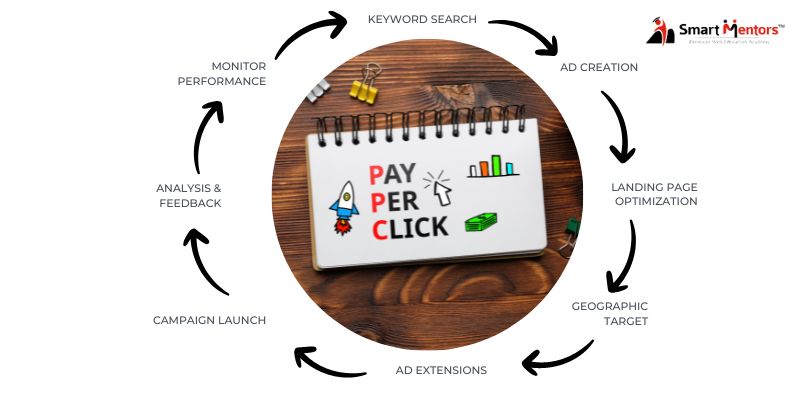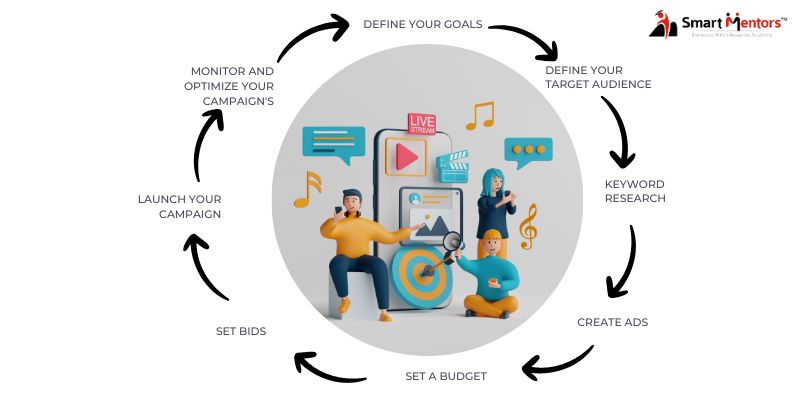The Ultimate Guide to PPC Advertising for Beginners

Pay-per-click (PPC) advertising is a digital marketing strategy that has become increasingly popular recently. It’s a method of online advertising in which advertisers pay each time a user clicks on one of their ads.
PPC can be a great way to drive traffic to your website and increase sales, but it can also be a complex and confusing process for beginners. In this guide, we’ll break down the basics of PPC advertising and provide tips for creating successful campaigns.
What Is PPC Advertising?
Online advertisers who use the PPC advertising model pay each time a user clicks one of their adverts. These advertisements may be shown on websites, social media networks, or search engines. The platform and the level of competition for the keywords you’re bidding on affect the cost per click (CPC).
PPC advertising aims to increase website visitors and increase conversions. Conversions can take the shape of a sale, the submission of a lead form, or even a phone call. PPC advertising can be a very efficient approach to connecting with potential clients who are looking for services or goods that are similar to yours.
How Does PPC Advertising Work?

PPC advertising works by enabling users to place bids on terms that are pertinent to their enterprise. The search engine shows a list of ads related to the user’s search when they enter a specific keyword. The ads are sorted based on a combination of bid amount and ad relevance, among other things.
The advertiser is charged the CPC when a user clicks on one of the ads. The amount charged can vary depending on the platform and the keyword’s competitiveness. Compared to less competitive keywords on social media platforms, for instance, highly competitive keywords on Google can cost several dollars per click.
PPC Advertising Platforms
Several different platforms offer PPC advertising, including:
- Google Ads: Google Ads is the most popular PPC advertising platform and offers ads on the Google search engine and the Google Display Network.
- Facebook Ads: Facebook Ads offers ads on the Facebook platform, Instagram, Messenger, and other partner websites.
- Twitter Ads: Twitter Ads offers ads on the platform and partner websites.
- LinkedIn Ads: LinkedIn Ads offers ads on the LinkedIn platform geared towards B2B advertising.
- Amazon Advertising: Amazon Advertising offers ads on the platform and is geared towards e-commerce advertising.
You can learn more about these platforms by taking a PPC course in Surat.
Tips for Choosing the Right PPC Advertising Platform
When choosing a pay-per-click (PPC) platform for your advertising campaigns, there are several factors to consider. Here are some of the key things to keep in mind:
1. Audience: Your target audience should be one of the top considerations when selecting a PPC platform. It’s critical to pick a platform with the appropriate user base and demographics for your business to ensure that the proper people see your advertisements.
2. Budget: Your budget is another crucial factor. You must select a PPC platform that works within your financial restrictions because different PPC platforms have varied charges per click (CPC) and minimum ad spending.
3. Ad types: There are various ad types accessible on various PPC sites. For instance, some platforms provide text advertisements, while others also provide display, video, and other ads. You must pick a platform that offers the ad forms that best support the objectives and message of your campaign.
4. Competition: There is fierce rivalry on some PPC sites, such as Google Ads, for particular phrases and industries. As a result, advertising may become more expensive, and standing out may become more challenging. There may be less competition on other platforms in some markets, such as Facebook Ads. Before investing in a platform, it’s crucial to consider the competition.
5. Industry: Some PPC platforms might be more appropriate for firms or sectors. For instance, Amazon Advertising is tailored for e-commerce companies, whereas LinkedIn ads focus on B2B advertising. You should pick a platform that supports your company’s and sector’s objectives.
6. Targeting Options: Different PPC platforms provide various targeting choices, including interest, location, and demographic targeting. You should pick a platform with the targeting tools required to connect with your target market.
7. Analytics and Report: Finally, it’s critical to take into account the analytics and reporting capabilities of each PPC platform. You should pick a platform that offers thorough information about your advertising, including clicks, conversions, and other crucial analytics. This will enable you to monitor the effectiveness of your campaigns and decide how much money to invest in advertising in the future based on facts.
Creating a PPC Campaign

Creating a successful PPC campaign requires careful planning and execution. Here are the basic steps involved in creating a campaign:
1. Define your goals: Determine what you want to achieve with your campaign, whether it’s increasing website traffic, generating leads, or increasing sales.
2. Define your target audience: Determine who your target audience is and which platform they’re most likely to use.
3. Keyword research: Conduct keyword research to determine which keywords are relevant to your business and which are most likely to drive traffic and conversions.
4. Create ads: Create compelling ads relevant to your target audience and include a strong call to action (CTA) that encourages them to click.
5. Set a budget: Determine how much you will spend on your campaign and set a daily or monthly budget accordingly.
6. Set bids: Set bids for the keywords you want to target, keeping in mind the competitiveness of each keyword.
7. Launch your campaign: Once your ads are created, and your budget and bids are set, launch your campaign and monitor its performance.
8. Monitor and optimize your campaign’s: Monitor performance regularly and adjust as needed. This includes adjusting bids, changing ad copy, and refining your targeting.
Conclusion
PPC advertising has the potential to be a very successful approach to increasing website traffic and increase conversions. But it needs rigorous preparation, execution, continuing oversight, and optimization. Beginners may design effective PPC campaigns that reach their target audience and help them accomplish their marketing objectives by using the advice provided in this guide or opting for a PPC course in Surat.







No comments, be the first one to comment !